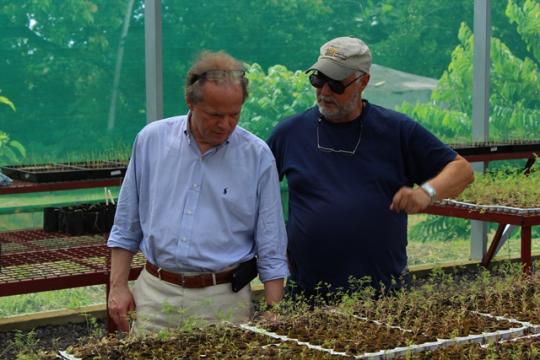
Nothing new from the World Bank
The op-ed, titled ‘Pacific connected: a Regional approach to development challenges facing island nations’, was a going-away present from Mr. Axel van Trotsenburg, World Bank East Asia and Pacific Regional Vice President.
Mr. Trotsenburg was visiting the region at the end of last month. Three solutions for his Pacific approach can be gleaned from the article. The first is that the World Bank needs to work ‘alongside global partners…to do more with Pacific island governments on unified approaches to development needs that promote a common destiny for such a vast and geographically fragmented region.’ The second is the regional approach to ‘provide the opportunities for Pacific island countries to benefit from economies of scale and shared knowledge’. The third is the ‘need to keep the momentum up and to do more, so people in Pacific island countries can see the benefits of these investments.’ The investments that Mr. Trotsenburg referred to are projects already jointly launched to help island countries mitigate impacts of climate change and adapt to the new realities they face.
The first solution rings familiar. The sentiment of course echoes the raison d’ȇtre of existing multilateral agreements, viz: The Paris Declaration on Aid Effectiveness, the Accra Agenda for Action and the Busan Partnership for Effective Development Cooperation. Thus, Mr. Trotsenburg’s declaration of working alongside global partners is stating the obvious. It is the commitment made under these multilateral declarations. He did say in his op-ed that the World Bank ‘has worked hard with Pacific Island countries to create an expanding partnership that has grown from a modest engagement a decade ago’. It is hoped of course that the expanding partnership is measured in increased utility and inclusive development and growth in the communities concerned and not in just dollar terms, the quantum of the loans extended.
Mr. Trotsenburg’s second point is essentially a re-enforcement of the regional approach as a means of benefitting from economies of scale and shared knowledge. But we have been doing this since 1971 and encountering intractable constraints in the process. It would have been nice to hear from the World Bank Vice President the lessons from other regional economic communities that can help Pacific regionalism overcome some of these deep-seated hurdles. How can we overcome the diseconomies of isolation, resulting from our fragmented geography, that negate our efforts at regional cooperation and even the gains from economies of scale? How can we attract especially concessionary funding for our regional projects given that the costs of regionalism in the region is naturally and peculiarly too expensive? How can we sort out the obstacles contributed by the political economy aspects of regionalism, for without a solution to these, all our collective efforts are in vain? It would have been nice to hear some pearls of wisdom.
Vice President Trotsenburg’s last point is to keep the momentum up and to do more so that Pacific island countries can see the benefits of these investments – i.e those aimed at mitigating impacts of climate change and adapting to the new realities the Pacific island countries face. This is more of a plea than a declaration of intent. It is akin to deflated optimism. For when it comes to climate change and climate change adaptations, it is evident that all our efforts in the Pacific will be nullified without the firm commitment of the major powers and global economy in reducing carbon emissions.
In a paper I had submitted to the Fiji Institute of Accountants 2014 Congress on ‘Today’s Vision: Tomorrow’s Reality: a Blue-Green Economy’, I have concluded: ‘In the absence of global commitment, this paper submits that it may only be a false sense of reality that will evolve. The paper further proffers that, in this context, and despite all our commendable efforts and noble intentions, the evidence of climate change and its associated global warming, environmental degradation, alarming poverty and escalating global disparities and resultant inequality and inequity will continue to be ‘an inconvenient truth’ that will not cease pricking the collective conscience of the global community in decades and generations to come.’

